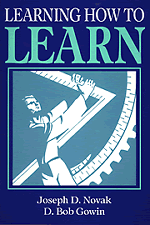Concept Maps
2006/10/01 09:24 PM Filed in: Books
I've been using Mindmaps for many years, after being introduced to it by Joyce Wycoff's book "Mindmapping". I've found many uses for them and found that they are a fantastic way of clarifying thinking and recording ideas. Personally I believe that I think better because of my use of Mindmaps. This is something I've talked about before, but from the perspective of Edward de Bono's teachings.
Anyway, a friend at work recently introduced me to the idea of concept maps through this website. I printed out the Java concept map, and was quite intrigued at the idea, so I tracked down the original book that describes concept maps. That book is Learning How to Learn, by Joseph Novak and Bob Gowin.

The authors describe concept maps as a "way to represent meaningful relationships between concepts in the form of propositions". Like mindmaps, concept maps have a central topic that the map begins from. In the case of concept maps, however, each topic is connected to each other topic using a proposition, some form of word or phrase that links the concepts together. Phrases like "leads to", "is because of", "becomes a part of", and so on are examples of these propositions.
In many ways this seems a logical extension of mindmaps, and is used similarly to depict a certain domain. The authors emphasize that this is a learning tool and the act of building these concept maps is used to solidify learning in a person and detect whether there are gaps in their knowledge of the area. This last part is intriguing, because mindmaps don't really have this "debugging" ability. The authors also provide a method for analysing the concept maps for these problems.
After reading that part of the book, I intend to try out these maps and see if they work the way they seem to. I'm encouraged by the Java concept map and my previous work on mindmaps, so we'll see what happens!
I should be able to try this with my Mindmanager program which, although expensive, is a great mindmapping tool.
Anyway, a friend at work recently introduced me to the idea of concept maps through this website. I printed out the Java concept map, and was quite intrigued at the idea, so I tracked down the original book that describes concept maps. That book is Learning How to Learn, by Joseph Novak and Bob Gowin.

The authors describe concept maps as a "way to represent meaningful relationships between concepts in the form of propositions". Like mindmaps, concept maps have a central topic that the map begins from. In the case of concept maps, however, each topic is connected to each other topic using a proposition, some form of word or phrase that links the concepts together. Phrases like "leads to", "is because of", "becomes a part of", and so on are examples of these propositions.
In many ways this seems a logical extension of mindmaps, and is used similarly to depict a certain domain. The authors emphasize that this is a learning tool and the act of building these concept maps is used to solidify learning in a person and detect whether there are gaps in their knowledge of the area. This last part is intriguing, because mindmaps don't really have this "debugging" ability. The authors also provide a method for analysing the concept maps for these problems.
After reading that part of the book, I intend to try out these maps and see if they work the way they seem to. I'm encouraged by the Java concept map and my previous work on mindmaps, so we'll see what happens!
I should be able to try this with my Mindmanager program which, although expensive, is a great mindmapping tool.


